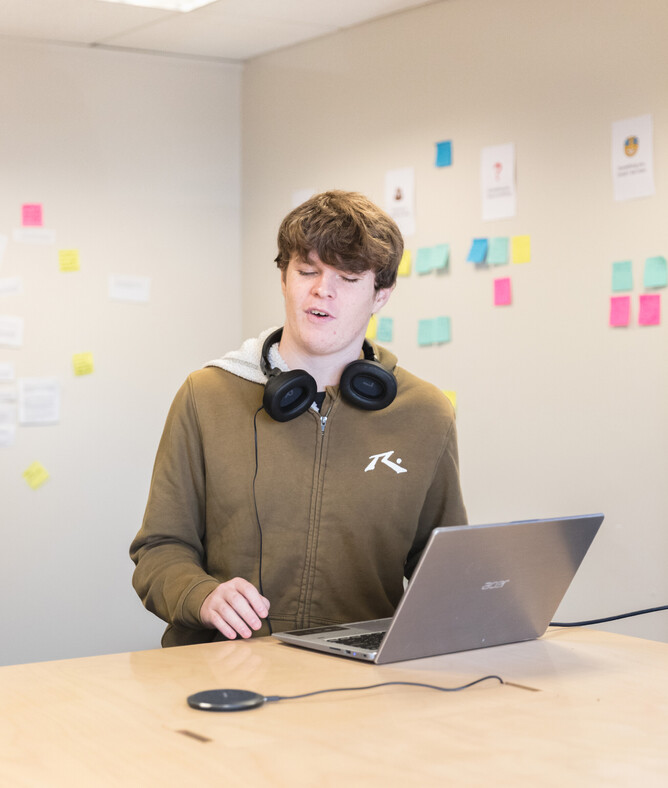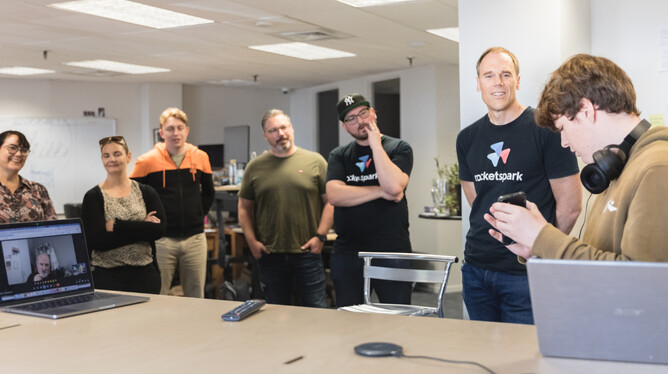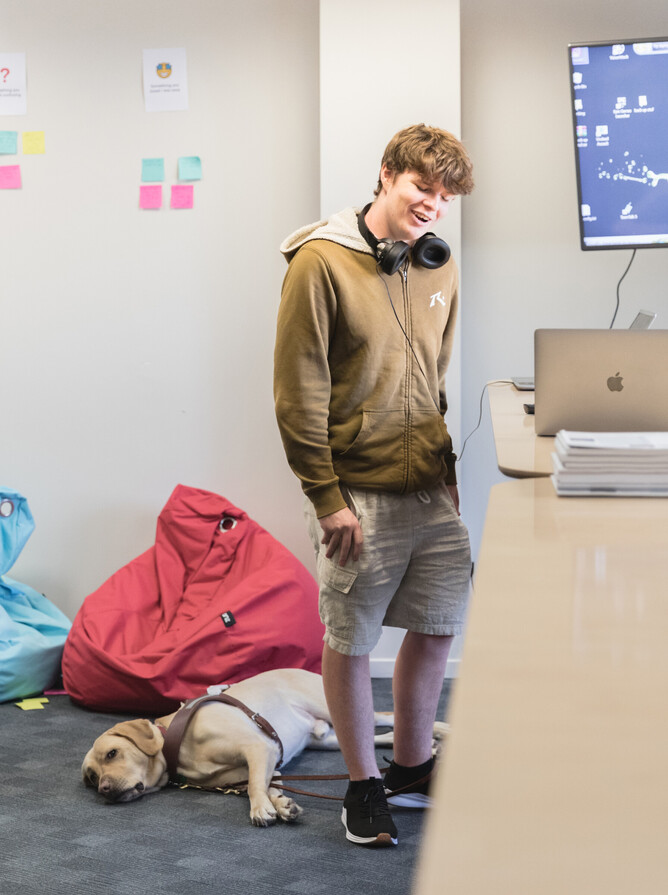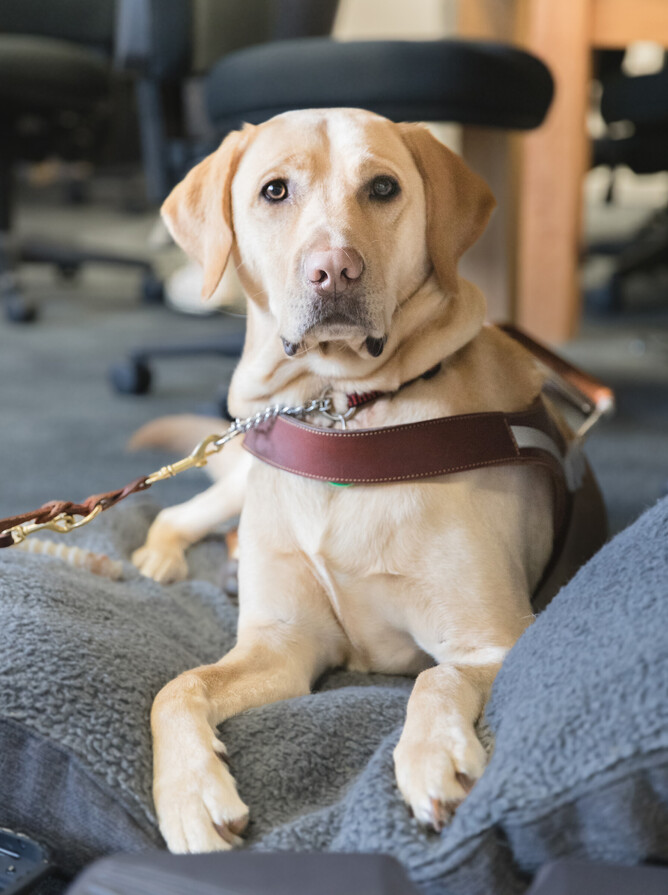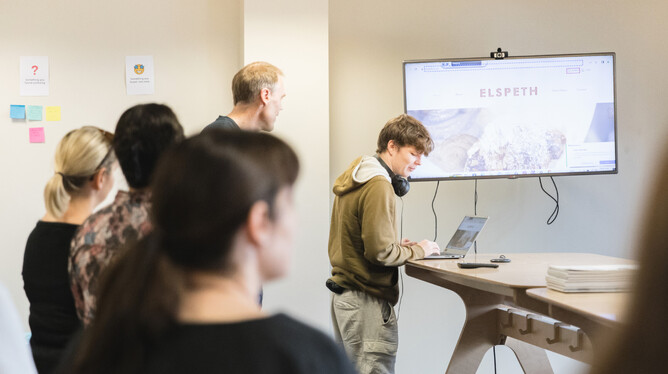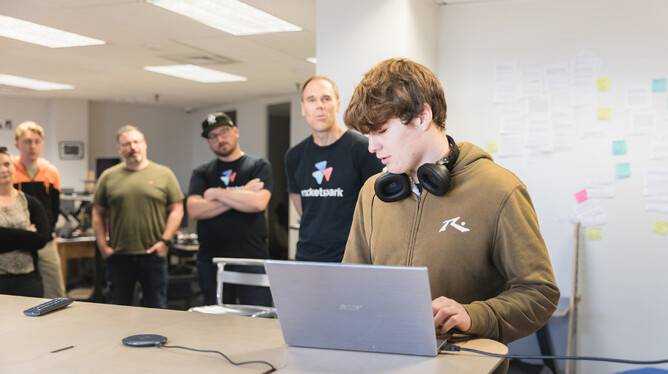The team at Rocketspark recently had the pleasure of having Lawson, and his guide dog Aidan, come into our HQ in Cambridge.
We sat down with Lawson and he brilliantly explained and demonstrated his experience as a user of the internet and his journey as an aspiring developer learning to code.
Why did you choose to get into coding?
Lawson: I find that coding is a lot easier than other professions, due to the fact that computers are super accessible, unlike a lot of other fields. Because it's all done from one terminal, one input, and then you get output and audio. You're not trying to work out where things are. It's just listening for the right things. I found coding is also like completing a goal, I like having a purpose to get to at the end. I always need a point to do something that needs to be a reason for me to do it. So doing coding means that at the end of it, I get a finished product to do something.
Coding seems really visual - do you rely quite heavily on your memory?
Lawson: I just have a screen reader with NVDA (non visual desktop access) and JAWS, Windows Narrator (those are all different screen readers). I use NVDA the most, it's really more and more about the screen readers. It does also involve memory a lot , you end up thinking ‘did I do that? Where did I put this?’ ect.
I've seen a video of you with your screen readers, and wow, they go fast. Have you had to build that speed up over time?
Lawson: Yeah, definitely. I've been using screen readers ever since I was around seven or eight years old. In the beginning, I can’t remember that much about what speed I used, but it definitely was a lot slower. And then over time, you go faster and faster, and then 5% faster, and we end up going so fast that even you're finding it hard to understand. But it means that you can finish things off faster. A lot of the time, you might slow it down a little bit depending on what you're doing. So for code, I'll slow it down enough so I can hear every single punctuation so that I know it's all correct, because one misplaced exclamation mark could screw the whole thing up.
Is coding something that you learned through school? Or is that extra curriculum?
Lawson: Well you'd think it would be something I learned through school, but it was my computer teacher who modified an original course so that I could do it. I also go to extracurricular with a person from Algorithmics. They give me one-on-one lessons.
What sort of opportunities or unique advantages do you think that you've got as someone with visual impairment coming into the world of coding?
Lawson: Well, I think that I kind of have a different outlook on everything. So instead of thinking ‘how is this gonna look’ it’s more ‘how is this going to be accessed?’ It’s more practical than the design part of it. I don't know how many advantages there are, a lot of the time you can get a lot of opportunities, because people are like, ‘wow, he's blind, and he's coding, which means that he must be smart enough to have come that far’. And then I get a bit more attention than the average visual coder, because it's something different. It's something unique. It's taking a while, especially with school these days, I'm trying to do NCEA level two. I’m not taking on as much coding as I used to because I just have to finish off the rest of school.
Walk me through what a typical coding session looks like for you. What systems do you use to make sure that you have accuracy? Is it mainly your screen reader, or do you have software that can check it as you go?
Lawson: I sometimes use VBscript, which has a bug checker for the code you've currently written. A lot of coding is bug checking, that's the main thing. But mostly, it's a screen reader. There are some cute little screen reader things you can turn on for indenting code, you can have it make a different sound for how far it's indented. Also using VB code, it'll tell you when it's not indented properly. That helps a lot.
Are those tools for people with visual impairment, or are they tools that are able to work for you?
Lawson: NVDA is a screen reader, it's made for those who can't see. VB code loads of people use that as a visual, it just has some nice accessibility options. Because a lot of things, you can kind of think of it as something like a visual programme with blind support, or a blind programme with the visual support, which means it's mainly made for blind people, but you can use it with vision.
The coding community is known for its collaboration and support. Have you found a network of other coders that have been helpful in your learning journey?
Lawson: Some yes, but not many. I mainly have been relying on my teacher at the moment, just to kind of get past the first initial stages of learning. I'm not really at the level yet where I can join some communities. There's definitely a big online blind community of coders. There are so many games that have been coded by those who are blind and a whole whole lot of programmes. But I'm just not at the coding level yet to join them and actually be able to collab with stuff. I have done a couple collaborations on some things, just for small projects with friends, but that's mostly it.
Are there many emerging technologies or advancements that you find particularly exciting or potentially beneficial?
Lawson: AI is definitely helpful. I use some Amazon Echoes in my room right now. They're all set up for surround sound systems and doing this interview. These things are what make AI great. I’ve got almost a whole smart room - smart bulbs, smart plugs, door sensors, motion sensors, and the whole nine yards. AI and smart devices are a massive help. There's this thing called the crown. It's a user-brainwave technology, like electromagnetic fields, or whatever your brain makes to scan what you're thinking, and then so you can control it by thought. It seems really cool for the future.
Can you explain how the crown works?
Lawson: It uses the electric signals from your brain so you train it so that when you think of a pineapple and what it tastes like, YouTube opens - you can link it up. But the interesting thing is, what I want to do is use that band, which scans your field, like brain waves under a hat, and then hook it up to a pair of glasses with a camera in it. And then when I think of something, I get a description in my earpiece of what is in front of me. If I use Chat-GPT 4.0, combined with this crown technology, plus camera glasses, then it will be seamless and people wouldn't know that I'm trying to activate it.
Looking ahead, what are your aspirations as a coder? Are there any specific projects or areas of interest that you really hope that you can explore in the future?
Lawson: It's definitely going to be in coding. I don't really care about design for obvious reasons. But I'm not really sure exactly what I want to do. I want to go and do something like Rocketspark and go on to website design. Or I could do game design which is like a whole whole different field, or maybe a type of software? Who knows? I just want to learn it. So I can make whatever I want really.
Finally, what advice would you give to anyone else that is visually impaired, and they're hesitant to pursue code coding or any other technical field?
Lawson: I think my advice would be: there's lots of ways to get out there, just to do it. Also, learn to touch type. I was kind of against it when I was younger, but it's definitely worth it because you can go way faster with coding, and learning how to use something like NVDA or JAWS. In my opinion, it is really important. If someone who can't see is going to go into the technical field the main thing is to know how to use a screen reader.
Thanks so much Lawson! We appreciate the time you took to come in and share your experience and story with us. We learned so much from you! We hope you left feeling inspired and excited about what the future holds for you.
If you’d like to have Lawson review your website and ensure it’s ready for the blind community, visit his website www.blindsite.co.nz
